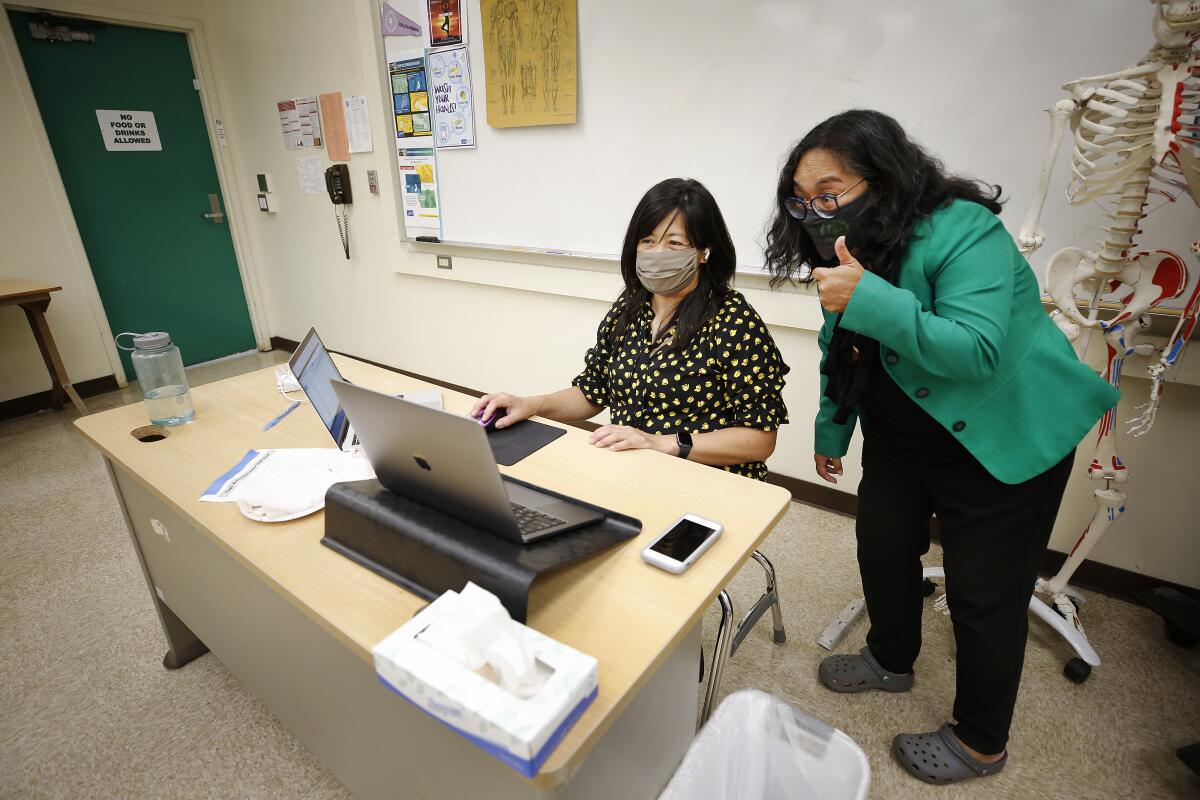L.A. Unified will not give Fs this semester and instead give students a second chance to pass

Citing pandemic hardships, Los Angeles school officials on Monday deferred any failing grades from this semester until at least Jan. 29, giving students additional time to avoid receiving an F in their classes.
The move is the latest effort by the nation’s second-largest school district to avoid penalizing students under increasing strain during the surging coronavirus emergency that continues to upend their education and worsen family hardships.
Compared with last year, grades have dramatically deteriorated, especially for Latino and Black students, English learners, students with disabilities, foster youth and those experiencing homelessness, according to a directive sent to secondary school principals Monday and obtained by The Times.
The move extends a modified version of the district’s “no fail” policy of the spring semester, when campuses first shut down at the onset of the pandemic. Monday’s decision won praise from Elmer Roldan, executive director of the advocacy group Communities in Schools of Los Angeles.
Given the limitations of distance learning, “failing kids is sending the wrong message and further increasing their chances of being pushed out of school,” Roldan said. “This is not the time to castigate students when their families are struggling to keep a roof over their heads and food on the table.”
The teachers union leadership said it supports “humane grading policies” but is concerned about the timing of the announcement — four days before the end of the semester — and a lack of coordination with the union in the district’s planning.
In Orange County, Santa Ana Unified also has modified grading in hopes of helping more students pass their classes. Overall, however, fewer school systems seem to be providing grading relief than in the spring, when campuses shut down suddenly and districts had difficulty pivoting to online learning.
The new L.A. Unified policy grew out of district concerns about the rise in D and F grades, a pattern mirrored across the country in school systems that have closed campuses and relied on distance-only learning. Among the problems faced by students is inconsistent or inadequate internet access and a poor learning environment at home.
In April, L.A. Unified prohibited failing grades for the spring semester and also determined that no student’s grade would be lower than it was on March 13, the final day of on-campus instruction. At the time, many teachers and some principals complained that the policy undermined student motivation and some reported a subsequent drop-off in student effort.
Such concerns resurfaced Monday during a faculty meeting at a high school in the San Fernando Valley, according to an English teacher who did not wish to be identified because she was not authorized to speak.
“Yes, it’s COVID time,” the teacher said. “But this soft bigotry of low expectations — including us being banned from demanding students ever comment with their voices or actually show themselves on camera during Zoom — will indeed help our low-income students stay on the bottom of the pile of learning.”
A high school principal from a different campus was more supportive. Given the unprecedented crisis, the principal said, students who earn A’s and B’s should get to keep them but that the only other grade handed out should be a pass. This principal — who also was not authorized to comment — requested anonymity.
The district directive — sent out by the Division of Instruction and initialed by Chief Academic Officer Alison Yoshimoto-Towery and Senior Executive Director Pedro Garcia — provides new data on students who were failing classes 15 weeks into the fall semester.
The percentage of failed classes among Latino high school students is 24.9%; for Black high school students, it is 23.2%. This compares with 12.9% for white students and 7.6% for Asians. The gap separating white and Asian students from Latino and Black students has widened since last year.
The number of failing grades for students learning English already was high, but it increased by nearly 15 percentage points, rising to 35%.
The overriding goal of the policy — besides avoiding failing grades — is to give students a chance to demonstrate academic knowledge without penalizing them for any factors that would traditionally result in a lower grade. Poor attendance, lack of class participation and failing to turn in assignments should not be the basis of a student receiving a failing grade, the directive says.
“Having the camera off should not be weighted into an academic mark,” states the district directive, referring to the now-ubiquitous class sessions on Zoom and other online platforms. “Attendance, engagement, turning work in on time, and/or behavior concerns should be reflected in the Work Habits or Cooperation mark, as appropriate.”
Work habits receive a rating of “Excellent,” “Satisfactory” or “Unsatisfactory.”
If a teacher does assign a failing mark, L.A. Unified’s records system will convert that grade into an “Incomplete” for the time being.
“The nature of the work to remove the ‘Incomplete’ must be fully stated in a Letter to Parents Regarding Incomplete Work,” the district states. “Incomplete work must be made up by January 29, 2021, unless mutually extended by student and teacher.”
Even a mark of Incomplete should not be assigned without notable measures to reach out, including multiple, documented attempts to contact the student and family, opportunities to make up work, collaboration with counselors and other student support staff and consultation with an administrator.
If a student turns in an assignment that demonstrates knowledge of the subject matter, such an assignment could justify a passing grade or better.
The approach in Santa Ana is different. There, if a student doesn’t do any work at all, the student receives a grade point average of 55 rather than zero. This gives the student a chance to achieve a passing grade — of 60% or better — by beginning to turn in assignments, even if they are late, said Fermin Leal, the district’s director of communications. An average of 60 would be a D.
“We still believe that doing the work that is assigned and that has been part of the curriculum is important,” Leal said.
Times staff writer Eric Sondheimer contributed to this report.
More to Read
Start your day right
Sign up for Essential California for news, features and recommendations from the L.A. Times and beyond in your inbox six days a week.
You may occasionally receive promotional content from the Los Angeles Times.







